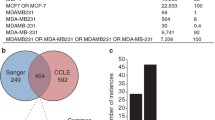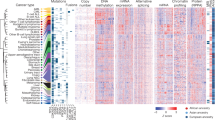Abstract
Hundreds of misleading reports are published every year containing data on human cancer cell lines that are derived from some other species, tissue or individual to that claimed. In consequence, millions of dollars provided for cancer research are being spent on the production of misleading data. This review describes how cross-contamination occurs, catalogues the use of false cell lines in leading biomedical journals, and suggests ways to resolve the problem.
Similar content being viewed by others
References
Bayer N, Schober D, Hutinger M, Blaas D and Fuchs R (2001) Inhibition of clathrin-dependent endocytosis has multiple effects on human rhinovirus serotype 2 cell entry. J Biol Chem 276: 3952–3962.
Van Bokhoven A, Varella-Garcia M, Korch C and Miller GJ (2001) TSU-Pr1 and JCA-1 cells are derivatives of T24 bladder carcinoma cells and are not of prostatic origin. Cancer Res 61: 6340–6344.
Cabot MC, Giuliano AE, Han TY and Liu YY (1999) SDZ PSC 833, the cyclosporine A analogue and multidrug resistance modulator, activates ceramide synthesis and increases vinblastine sensitivity in drug-sensitive and drug-resistant cancer cells. Cancer Res 59: 880–885.
Chakraborty M, Qiu SG, Vasudevan KM and Rangnekar VM(2001) Par-4 drives trafficking and activation of Fas and FasL to induce prostate cancer cell apoptosis and tumor regression. Cancer Res 61: 7235–7263.
Dirks WG, MacLeod RA and Drexler HG (1999) ECV304 (endothelial) is really T24 (bladder carcinoma): Cell line crosscontamination at source. In Vitro Cell Devl Biol 35: 558–559.
Drexler HG, Dirks WG and MacLeod RAF (1999) False human hematopoietic cell lines: cross-contamination and misinterpretations. Leukemia 13: 1601–1607.
Editorial (1981) Responsibility for trust in research. Nature 289: 211–212.
Flatau G, Lemichez E, Gauthier M, Chardin P, Paris S, Fiorentini C and Boquet P (1997) Toxin-induced activation of the G protein p21 Rho by deamidation of glutamine. Nature 387: 729–733.
Gartler SM (1967) Genetic markers as tracers in cell culture. Natl Cancer Inst Monogr 26: 167–195.
Gartler SM (1968) Apparent HeLa cell contamination of human heteroploid cell lines. Nature 217: 750–751.
Gayraud B, Keene DR, Sakai LY and Ramirez F (2000) New insights into the assembly of extracellular microfibrils from the analysis of the fibrillin 1 mutation in the tight skin mouse. J Cell Biol 150: 667–680.
Gey GO, Coffman WD and Kubicek MT (1952) Tissue culture studies of the proliferative capacity of cervical carcinoma and normal epithelium. Cancer Res 12: 264–265.
Goan YG, Zhou B, Hu E, Mi S and Yen Y (1999) Overexpression of ribonucleotide reductase as a mechanism of resistance to 2,2-difluorodeoxycytidine in the human KB cancer cell line. Cancer Res 59: 4204–4207.
Gold M (1986) A conspiracy of cells. One woman's immortal legacy and the scandal it caused. State University of New York Press.
Gorman JJ, McKimm-Breschkin JL, Norton RS and Barnham KJ (2001) Antiviral activity and structural characteristics of the nonglycosylated central subdomain of human respiratory syncytial virus attachment (G) glycoprotein. J Biol Chem 276: 38988–39994.
Komatsu M, Sumizawa T, Mutoh M, Chen ZS, Terada K, Furukawa T, Yang XL, Gao H, Miura N, Sugiyama T and Akiyama S (2000) Copper-transporting P-type adenosine triphosphatase (ATP7B) is associated with cisplatin resistance. Cancer Res 60: 1312–1316.
Li J, Post M, Volk R, Gao Y, Li M, Metais C, Sato K, Tsai J, Aird W, Rosenberg RD, Hampton TG, Li J, Sellke F, Carmeliet P and Simons M (2000) PR39, a peptide regulator of angiogenesis. Nature Medicine 6: 49–55.
MacLeod RAF, Dirks WG, Matsuo Y, Kaufmann M, Milch H and Drexler HG (1999) Widespread intraspecies cross-contamination of human tumour cell lines. Int J Cancer 83: 555–563.
Masters JR (2000) Human cancer cell lines: Fact and fantasy. Nature Rev Molec Cell Biol 1: 233–236.
Masters JRW, Thomson JA, Daly-Burns B, Reid YA, Dirks W, Packer P, Toji LH, Ohno T, Tanabe H, Arlett CF, Kelland LR, Harrison M, Virmani A, Ward TH, Ayres KG and Debenham PG (2001) STR profiling provides an international reference standard for human cell lines. Proc Natl Acad Sci USA 98: 8012–8017.
Masters JR (2002) HeLa cells 50 years on: The good, the bad and the ugly. Nature Rev Cancer 2: 315–319.
Merten O-W (1989) Culture of Hybridomas - A Survey. In: Miller AOA (ed.) Advanced Research on Animal Cell Technology, NATO ASI Series E. Applied Sciences, Vol. 156, (pp. 367–398) Kluwer Academic Publishers, Dordrecht.
Moffatt KA, Johannes WU, Hedlund TE and Miller GJ (2001) Growth inhibitory effects of 1α, 25-Hidroxyvitamin D3 are me74 diated by increased levels of p21 in the prostatic carcinoma cell line ALVA-31. Cancer Res 61: 7122–7129.
Nelson-Rees WA, Flandermeyer RR and Hawthorne PK (1974) Banded marker chromosomes as indicators of intraspecies cellular contamination. Science 184: 1093.
Nelson-Rees WA and Flandermeyer RR (1976) HeLa cultures defined. Science 191: 96–98.
Nelson-Rees WA, Daniels DW and Flandermeyer RR (1981) Cross-contamination of cells in culture. Science 212: 446–452.
Nelson-Rees WA (2001) Responsibility for truth in research. Phil Trans R Soc Lond B 356: 849–851.
O'Brien SJ (2001) Cell culture forensics. Proc Natl Acad Sci USA 98: 7656–7658.
O'Toole CM, Povey S, Hepburn P and Franks LM (1983) Identity of some human bladder cancer cell lines. Nature 301: 429–430.
Park SY, Lam W and Cheng Y (2002) X-ray repair cross-complementing gene I protein plays an important role in camptothecin resistance. Cancer Res 62: 459–465.
Sinclair JF and O'Brien AD (2002) Cell surface-localized nucleolin is a eukaryotic receptor for the adhesin intimin-gamma of enterohemorrhagic Escherichia coli O157:H7. J Biol Chem 277: 2867–2885.
Stacey GN, Masters JRW, Hay RJ, Drexler HG, MacLeod RAF and Freshney RI (2000) Cell contamination leads to inaccurate data: We must take action now. Nature 403: 356.
Tabuchi M, Yoshimori T, Yamaguchi K, Yoshida T and Kishi F (2000) Human NRAMP2/DMT1, which mediates iron transport across endosomal membranes, is localized to late endosomes and lysosomes in HEp-2 cells. J Biol Chem 275: 22220–22228.
Yang N, Higuchi O, Ohashi K, Nagata K, Wada A, Kangawa K, Nishida E and Mizuno K (1998) Cofilin phophorylation by LIMkinase 1 and its role in Rac-mediated actin reorganization. Nature 393: 809–812.
Zha S, Gage WR, Sauvageot J, Saria EA, Putzi MJ, Ewing CM, Faith DA, Nelson WG, De Marzo AM and Isaacs WB (2001) Cyclooxygenase-2 is up-regulated in proliferative inflammatory atrophy of the prostate, but not in prostate carcinoma. Cancer Res 61: 8617–8623.
Author information
Authors and Affiliations
Rights and permissions
About this article
Cite this article
Masters, J.R. False cell lines: The problem and a solution. Cytotechnology 39, 69–74 (2002). https://doi.org/10.1023/A:1022908930937
Issue Date:
DOI: https://doi.org/10.1023/A:1022908930937




